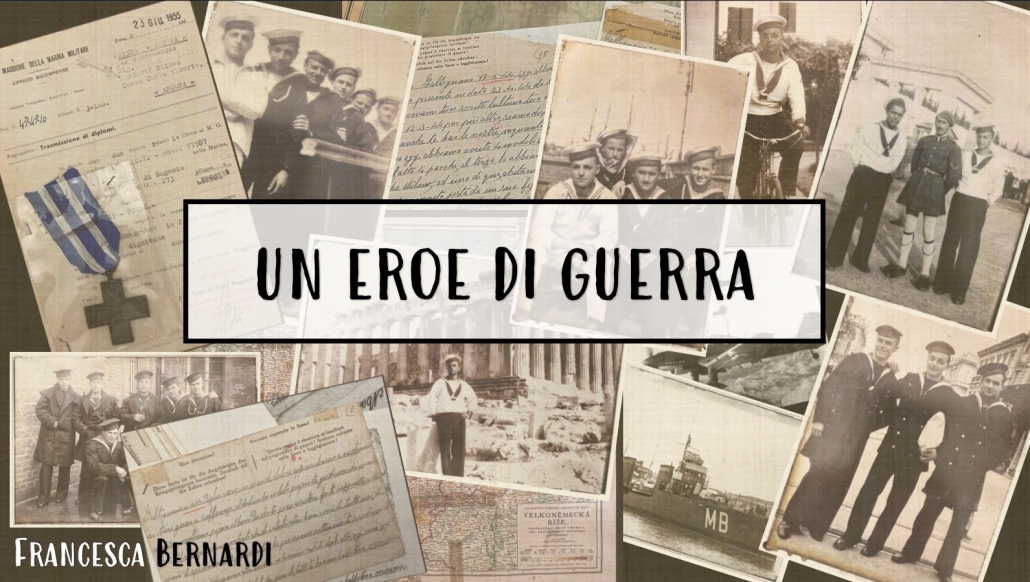Eliseo Manzotti, a war hero
On 30 September last, Eliseo Manzotti, Fiorisa’s father and Enzo’s father-in-law, passed away.
He was 100 years old last 8 December: a remarkable age, perhaps reached because his physique had been hardened by the terrible experience during the war. His great-granddaughter Francesca tells us about it.
When Grandpa Eliseo told me his incredible story, I was really moved. That is why I would like to share it with you.
Eliseo Manzotti, the second son of six brothers, was born on 8 December 1922 in Ancona. When he was only sixteen years old, he joined the Navy, and participated in the Second World War from 1942 to 1945. He returned home only after a dramatic journey across Europe.
From Ancona, after enlisting in the navy, he was sent to Greece, to Athens, in July 1942, and stayed there until September 1943. The Second World War has long since broken out: Eliseo works at the port, every day he sees the same panorama: warships setting sail for battle and shipwrecked people returning to the port from the Aegean Sea, exhausted and massacred.
After the armistice of 8 September, Eliseo was forced to choose between continuing to fight alongside the Germans or returning to Italy. By choosing the second option he would not actually return to Italy, but would become a prisoner of the Germans. Eliseo knows this, but rather than fight alongside the Germans, he chooses imprisonment anyway. He is loaded onto a cattle wagon, together with 60 other men who, travelling for fifteen days without a break, arrive at the Aagerapp labour camp in Poland, on the border with Lithuania. He was then transferred to the town of Zagan, where he worked as a turner, and then to Zwittau in Slovakia, until 8 May 1945, the day after the end of the Second World War, when the Americans and the Soviets succeeded in defeating the German army.
Eliseo, finally free, tries to reach an Italian consulate, first in Vienna and then in Prague, seeking help to return to Italy. But he finds the consulates deserted, and realises that there is no alternative but to walk back to Italy. He retrieves a map and with that he traces the way back. Soon numerous Italians join him, and gradually the group grows in number: they become more than a hundred. They do not go unnoticed and the Russian soldiers in Benesou, Czechoslovakia, capture them and take them to a camp from where they would later be taken to Siberia.
The Czechoslovak partisans were given the task of guarding the camp: although they collaborated with the Russian soldiers, they felt no sympathy for them. Eliseo confides in one of them to see if and how to escape. There is only one possibility: to reach the offices of the Soviet General Staff, to meet the head of the Czechoslovak Partisans and ask him for a ‘pass’ with which to leave the camp. So Eliseo gathers clothes with which to disguise himself as a partisan, makes himself a partisan coat of arms (a red star with the hammer and sickle drawn on it), attaches it to his cap and, dressed like this, sneaks into the General Staff building, ignored by the Russian soldiers. There he meets the leader of the Partisans and obtains a ‘pass’ for all Italians.
In the meantime, however, the camp was demobilised and the long march of prisoners towards Siberia began. Eliseo could not find anyone, but he did not lose heart: he found a passage on a Soviet army truck and reached the convoy. Here he starts shouting to all the Italians to get out of the ranks on the strength of the pass he had been given. He gathers more than a hundred who, free, begin the return journey two by two, so as not to be conspicuous. He travelled almost the entire journey on foot, passing through Brno (Czechoslovakia), Villach (Austria) and then crossing the Eastern Alps to enter Italy.
After a little over a month, he reaches Ancona aboard a truck loaded with potatoes. In the central square of the city he glimpses his father, but decides not to call him: it had been more than a year since his loved ones had received any news; so he fears that the emotion of seeing him suddenly might cause him to fall ill. So he contacts some friends to announce his imminent arrival home to his family.
A few years later he married Ornella and had a daughter: Fiorisa, my mother Anna Rita’s mother.
This was my great-grandfather: a hero.
Francesca Bernardi



